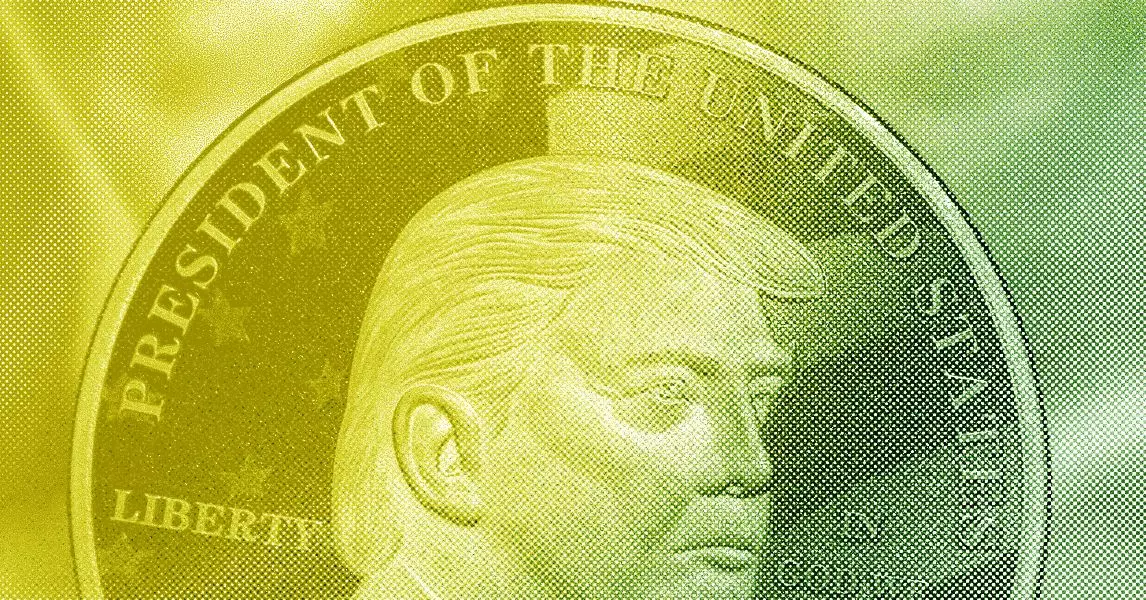In an unpredictable twist emblematic of modern politics, former President Donald Trump ventured into the uncharted waters of cryptocurrency. This move has raised numerous eyebrows — not because the former president has long been a figure of controversy, but because his shifting stance and newly minted TrumpCoin encapsulate a larger narrative about power, profit, and ethics in political landscapes.
On April 23rd, Trump announced an exclusive dinner aiming to woo prominent investors in his cryptocurrency venture. The implications of this announcement led to a staggering spike in trading activity tied to TrumpCoin, artificially inflating Trump’s net worth on paper. But questions about ethical considerations permeate this excitement. Selling access to the highest echelons of political influence, even indirectly, seems like a precarious dance on the line of legality and moral integrity.
From Skeptic to Advocate: Trump’s Cryptocurrency Journey
Interestingly, Trump’s shift from cryptocurrency skeptic to advocate is noteworthy. Just two years ago, he labeled Bitcoin a “scam” that required strict regulation. This stark contrast not only raises questions about his financial motives but also underscores the fluidity of Trump’s positions, reflecting an adaptable pragmatism that has characterized his approach throughout his life. It is intriguing how a mindset can transform when financial gain is at play, even for someone who once occupied the Oval Office.
His introduction of a meme coin, a category often dismissed as frivolous, is both bizarre and fitting, given Trump’s well-publicized affinity for social media and memetic communication. Meme coins like TrumpCoin thrive on virality and community engagement rather than the underlying value or technology, and that may resonate deeply with his base. But what does this mean for the grassroots investors drawn into his web?
The Ethics of Cryptocurrency in Politics
The ethical implications of Trump’s ventures cannot be ignored. Traditionally, political leaders have had to navigate the minefield between public service and personal profit. However, the rise of cryptocurrencies introduces new layers of complexity. The inherent anonymity and speculative nature of digital currencies can easily obscure financial transactions, complicating accountability in government.
Are politicians like Trump simply exploiting a new platform to enrich themselves while simultaneously promoting a potentially dangerous financial landscape? The intertwining of politics and personal gain in this instance raises alarms over favoritism and access, particularly since the commodities market is notoriously volatile. What safeguards exist to protect the ordinary investor who might be drawn to the allure of quick profits offered by such high-profile endorsements?
Cryptocurrency: A New Frontier for Political Branding
The intersection of cryptocurrency and political branding is another fascinating aspect of this narrative. With TrumpCoin, we witness a unique evolution in how politicians can extend their brand identity beyond traditional mediums. Instead of merely aligning with a political party or family legacy, crypto becomes a new vehicle for personal branding.
However, as this transformation unfolds, we must interrogate its implications further. If politicians continue to create branded cryptocurrencies, we may face a future where political allegiances are dictated by investments in digital currencies. This scenario could, frighteningly, lead to a system where monetary value influences voter loyalty, undermining the foundational principles of democratic engagement.
The Role of Regulation and Consumer Awareness
As the lines continue to blur between investment, industry, and politics, the need for regulation becomes more pressing. While some countries have embraced cryptocurrencies, the United States remains in a state of indecision about regulatory frameworks. The rapid evolution of digital currencies necessitates a cautious yet proactive approach to protect consumers and ensure fair practices.
Moreover, investor education is crucial. The allure of cryptocurrencies like TrumpCoin can often overshadow the inherent risks involved. More comprehensive consumer awareness programs could empower individuals to make informed decisions while recognizing potential pitfalls. If we want a robust market space — one that operates fairly and transparently — consumer protection must be a priority.
Ultimately, Trump’s foray into cryptocurrency encapsulates the complexities of modern governance and the evolving landscape of digital finance. It challenges us to consider the implications of brand loyalty merging with currency speculation, as well as the need for regulations that can keep pace with this digital revolution. With these powerful forces at play, the political and financial arenas demand greater scrutiny as we embark on this unpredictable journey.

